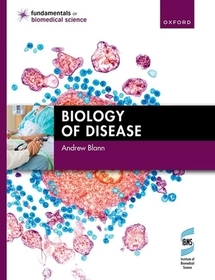
Biology of Disease
Series: Fundamentals of Biomedical Science;
- Publisher's listprice GBP 52.99
-
25 315 Ft (24 110 Ft + 5% VAT)
The price is estimated because at the time of ordering we do not know what conversion rates will apply to HUF / product currency when the book arrives. In case HUF is weaker, the price increases slightly, in case HUF is stronger, the price goes lower slightly.
- Discount 10% (cc. 2 532 Ft off)
- Discounted price 22 784 Ft (21 699 Ft + 5% VAT)
Subcribe now and take benefit of a favourable price.
Subscribe
25 315 Ft

Availability
Estimated delivery time: In stock at the publisher, but not at Prospero's office. Delivery time approx. 3-5 weeks.
Not in stock at Prospero.
Why don't you give exact delivery time?
Delivery time is estimated on our previous experiences. We give estimations only, because we order from outside Hungary, and the delivery time mainly depends on how quickly the publisher supplies the book. Faster or slower deliveries both happen, but we do our best to supply as quickly as possible.
Product details:
- Publisher OUP Oxford
- Date of Publication 24 May 2024
- ISBN 9780198834236
- Binding Paperback
- No. of pages752 pages
- Size 245x190x30 mm
- Weight 1432 g
- Language English
- Illustrations More than 300 colour line drawings and photographs 564
Categories
Short description:
By telling the whole story of how a disease develops, how it is diagnosed, and how it is treated, Biology of Disease provides students with the integrated understanding of both the molecular and clinical aspects of diseases that they will need to succeed as practising biomedical scientists.
MoreLong description:
The Fundamentals of Biomedical Science series has been written to reflect the challenges of practising biomedical science today. It draws together essential basic science with insights into laboratory practice to show how an understanding of the biology of disease is coupled to the analytical approaches that lead to diagnosis. Assuming only a minimum of prior knowledge, the series reviews the full range of disciplines to which a biomedical scientist may be exposed - from microbiology to cytopathology to transfusion science.
Biology of Disease provides an integrated introduction to the basic cell biology that underlies disease processes and the diagnosis and management of those diseases. By telling the whole story of how a disease develops, how it is diagnosed, and how it is treated, the text provides a thorough understanding of both the molecular and clinical aspects of diseases that are needed to succeed as a practising health care professional. Featuring a wide range of diseases, the text places particular emphasis on diseases that biomedical scientists and other health care professionals are most likely to encounter in a clinical setting and that have the greatest impact on people's lives. This is reflected in the book's detailed coverage of cancer and cardiovascular disease, which have long been causing many deaths each year, and its discussion of the COVID-19 pandemic.
The inclusion of clinical case studies throughout shows how the theory of disease processes informs the diagnosis and treatment of different diseases in practice. Self-check questions and discussion questions in the book support active learning and allow students to check their understanding. Multiple-choice questions are embedded into the e-book and Science Trove, allowing students to recap seamlessly on what they have learnt in each chapter.
Digital formats and resources
Biology of Disease is available for students and institutions to purchase in a variety of formats.
- The e-book offers a mobile experience and convenient access along with functionality tools, navigation features, and links that offer extra learning support: www.oxfordtextbooks.co.uk/ebooks
- E-book and Science Trove products are enriched with digital multiple-choice questions and answers to the self-check questions
- Instructor resources include figures from the book, available to download
Table of Contents:
An introduction to the biology of disease
Basic concepts of disease
The aetiology of cancer
Clinical oncology 1: Basic concepts and common cancers
Clinical oncology 2: Further types of cancer
The aetiology and cellular basis of cardiovascular disease
The risk factors for cardiovascular disease
Clinical cardiovascular disease
Basic and laboratory immunology
Clinical immunology
Blood and its diseases
Diseases of malnutrition and the digestive system
Disease of the respiratory system
The genitourinary system
Endocrine disease
Chromosomal, genetic, and metabolic disease




